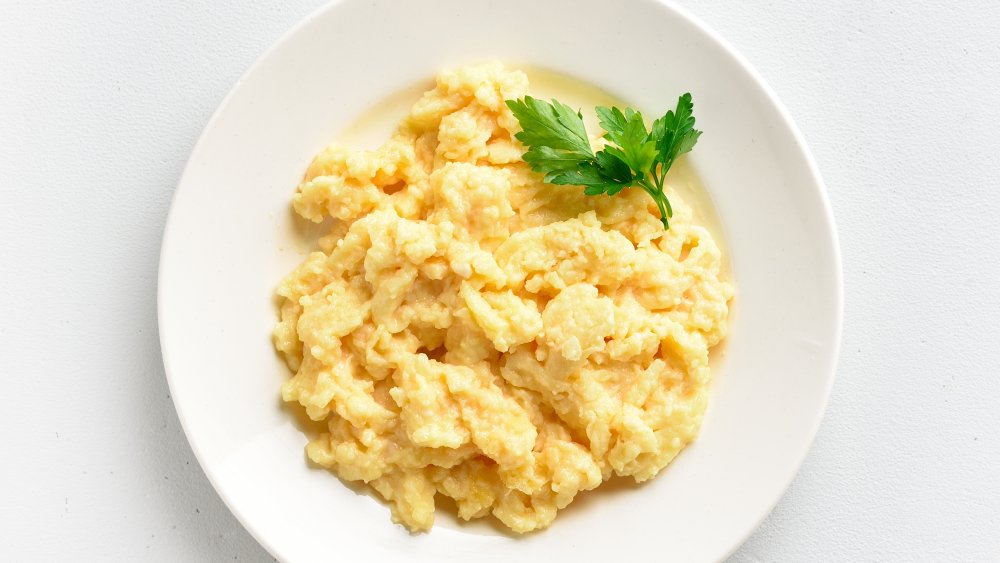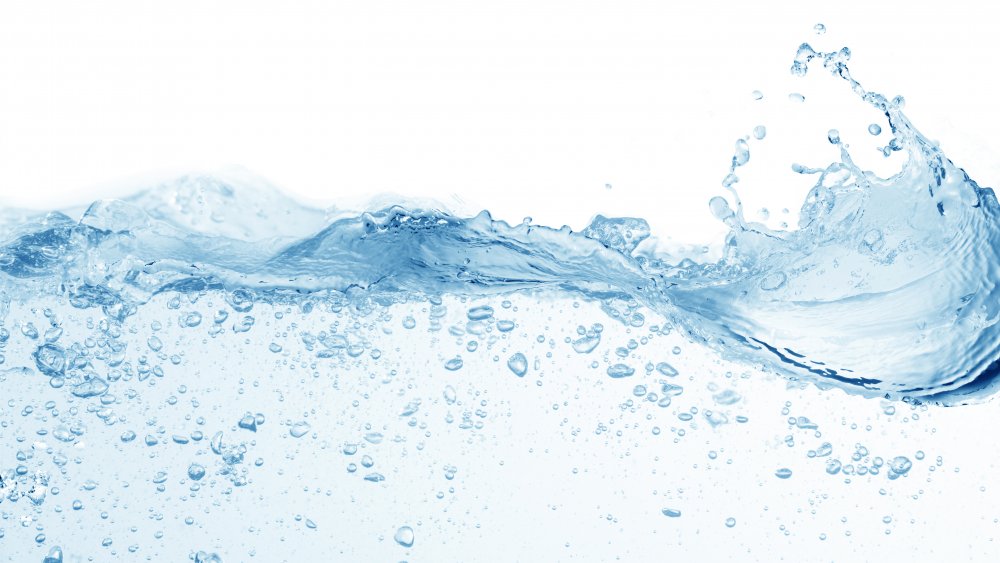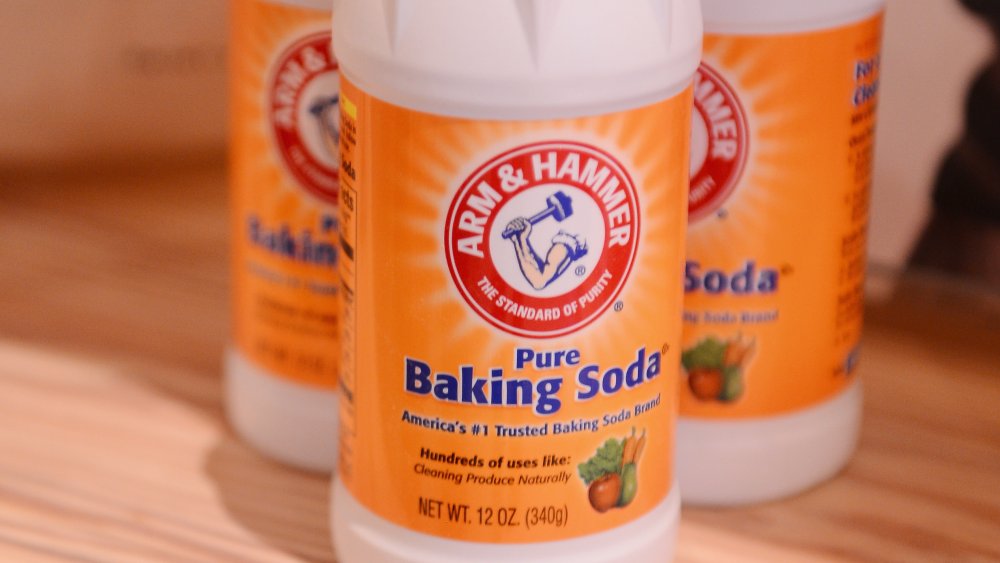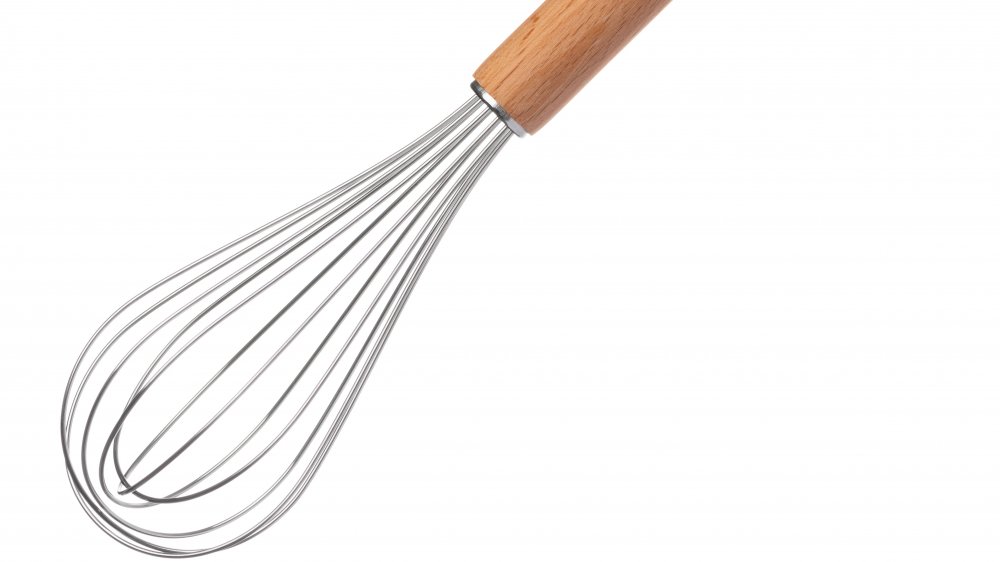The Secret Ingredient That's Missing From Your Scrambled Eggs
Americans love eggs, be they poached, fried, or, our favorite, scrambled. But for years, many of us cut back on our favorite breakfast food, as nutritionists said the little orbs were loaded with cholesterol and bad for our heart health. Luckily, the scientific community finally brought us some good news: Eggs are actually healthy. According to Anthony Komaroff, M.D., via the Harvard Health Letter, the most recent studies show us that for most people who eat an egg daily, there is no increased risk of a heart attack, stroke, or cardiovascular disease. As of last year, the average American was eating nearly 280 eggs a year, reports the Washington Post.
Now that we're fully committed to the egg, there's a little trick you might not know that can take your scrambled eggs from so-so to spectacular: Just whip in 1 teaspoon of garlic powder, suggests the foodies at Spoon University. They say it adds just the right flavor to transform bland eggs into a more satisfying meal. Here's why: Garlic powder is simply dehydrated, pulverized garlic. And it contains the same compounds that make fresh garlic taste so good. And we love garlic! "We put it into our mouths, the [compounds] go up into our nose, [and] the smell is really what makes us like it," Sheryl Barringer, professor and department chair of food science and technology at The Ohio State University explained to Live Science.
Add water for melt-in-your-mouth scrambled eggs
Now that you've amped the flavor, it's time to talk about texture. You probably know you should add a bit of liquid to your eggs as you whip them up. But a common mistake? Many of us add milk, thinking it will create a fluffier final product. But that simply isn't the case. According to Southern Living, we all should be adding a bit of water to our egg mixture. While milk can add richness, it also weighs down the dish and can make the texture rather tough and unappealing. In contrast, a splash of water does just the opposite: As it warms up on your stovetop, it has a steaming effect, giving your eggs an airy lightness that can't be matched. So, what's the right amount of H2O? Delish suggest adding 1 to 1 1/2 tablespoons of water for each egg.
If you don't want to do away with dairy entirely and would like some cheese in your scrambled eggs, you absolutely can go for it — and without the leaden effect. The trick is simply tossing in your cheese of choice in the final minutes of cooking, so the eggs already have achieved their maximum state of fluffiness.
Mix in baking soda for cloud-like scrambled eggs
A staple in cookie, cake, and muffin recipes, baking soda is a must-have for most baked goods. It's probably even already made an appearance at your breakfast table, as it's in most pancake mixes. What's more, it actually can give your eggs a lift, too. In fact, The Daily Meal suggests it's an important ingredient for creating the lightest and fluffiest scrambled eggs. Just as it helps prevent those sweet treats from becoming dense and heavy, baking soda transforms eggs due to its unique chemical makeup. Basically, it works by releasing carbon dioxide bubbles when it interacts with liquid and heat, creating a double-whammy of airiness. The key is not overdoing it: It's recommended you use just 1/8 of a teaspoon for every two large eggs. Just sprinkle it in as you're whisking and prepare to be amazed.
The right cooking method for scrambled eggs
Okay, so you've fired up the flavor and discovered how to achieve just the right texture. Next, it's important to have your scrambled eggs cooking technique down pat. First, be sure to whip your eggs (and garlic, water and baking soda) well before they go into the pan, per Bon Appetit. It will add air to the mixture, making eggs even lighter and more tender. Next, scramble your eggs over low heat to reduce your risk of overcooking them, and continuously stir — that way you won't wind up with an icky, brown mess that tastes terrible (via Fine Cooking). The eggs will then break up into smaller curds, which are softer and creamier. Are you hungry yet?
Now that we've decoded how to make the perfect plate of scrambled eggs — don't forget that garlic powder secret ingredient — and cleared the air on the cholesterol question, why not whip some up, well, right now? Because who said scrambled eggs are only for breakfast?



